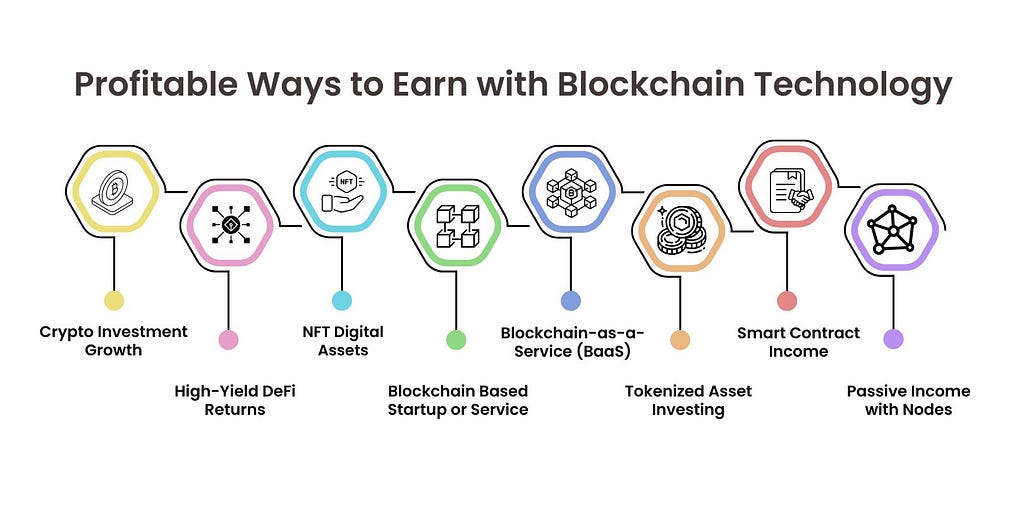Top 8 Profitable Ways to Make Money with Blockchain for Startups and Entrepreneurs
Are you missing out on the next big wave of wealth creation? Blockchain technology has quietly been revolutionizing finance, supply chains, healthcare, and more for over a decade. Consider this — as of 2024, the global blockchain market is projected to be valued at over $60 billion, with more and more industries embracing it each year. Yet, a common misconception persists — that blockchain is only about cryptocurrency. This couldn’t be further from the truth.
 Ways to Make Money With Blockchain
Ways to Make Money With BlockchainIn reality, blockchain offers a multitude of avenues for earning revenue and building sustainable businesses. For investors and entrepreneurs alike, understanding these diverse opportunities is crucial to staying ahead in an increasingly competitive world. Let’s explore the most effective 8 ways to leverage blockchain technology to drive profits and make a lasting impact.
Profitable 8 Ways to Make Money with Blockchain Technology
Is blockchain the next big opportunity you can’t afford to miss? With industries worldwide racing to adopt this groundbreaking technology, the possibilities for generating revenue through blockchain are expanding every day. You can make money with blockchain technology in many ways. From cryptocurrency investments to innovative startups, blockchain offers diverse pathways for creating wealth and building sustainable ventures. Let’s dive into eight impactful ways you can start earning with blockchain today.
 8 Ways to Make Money With Blockchain
8 Ways to Make Money With Blockchain1. Investing in Cryptocurrencies for Long-Term Growth
Blockchain’s roots lie in cryptocurrency, and it remains one of the most direct ways to benefit from the technology. The cryptocurrency market, while known for its volatility, offers long-term growth potential for investors who adopt sound strategies.
Key Strategies for Crypto Investment
To succeed with cryptocurrency investments, it’s important to approach the market with two main strategies in mind -
HODLing (Holding) — This long-term strategy involves buying and holding cryptocurrencies like Bitcoin, Ethereum, or other promising altcoins, anticipating that they will increase in value over time.Active Trading — For those comfortable with market analysis, active trading allows investors to profit from price fluctuations, buying low and selling high.A well-diversified portfolio across stablecoins, growth coins, and emerging altcoins is recommended to balance risks. Additionally, using reliable platforms such as Coinbase or Binance can help you stay updated and secure.
2. Leveraging DeFi (Decentralized Finance) for High-Yield Returns
Decentralized Finance, or DeFi, has transformed the way individuals earn returns, bypassing traditional banks to offer higher yields through blockchain-based financial products. As a disruptive movement, DeFi presents exciting opportunities for earning passive income.
How to Earn with DeFi?
DeFi allows users to engage in -
Yield Farming — Providing liquidity to DeFi protocols in exchange for rewards, often in the form of interest or additional tokens.Liquidity Provision — Contributing to liquidity pools, such as Uniswap or SushiSwap, where users earn a portion of transaction fees.Decentralized Lending and Borrowing — Platforms like Aave and Compound enable users to lend out assets and earn interest with higher rates than traditional banks.Tip — While DeFi can yield substantial rewards, its decentralized nature requires careful risk management, as there’s limited regulatory oversight.
3. Exploring NFTs (Non-Fungible Tokens) for Unique Digital Asset Investments
The NFT (Non-Fungible Token) market has surged, capturing attention across sectors such as art, gaming, and collectibles. NFTs are unique digital assets authenticated by blockchain, allowing them to hold and increase in value over time.
Strategies for NFT Investments
Investing in NFTs involves understanding which assets are likely to appreciate -
Digital Art — Art NFTs have become a popular avenue, with unique works often selling for high prices.Collectibles and Gaming — Projects like NBA Top Shot and Axie Infinity offer opportunities to invest in collectible NFTs and in-game items.Understanding Market Trends — Keeping track of high-demand creators and collections can provide insights into potentially profitable NFTs.Since the NFT market can be speculative, it’s important to research trends, invest cautiously, and consider your risk tolerance.
4. Building a Blockchain-Based Startup or Service
For entrepreneurs, blockchain offers a foundation for creating unique business models that couldn’t exist without decentralized technology. From decentralized applications (dApps) to consultancy services, the potential for startups is immense.
Steps to Establish a Blockchain Business
Identify a Profitable Niche — Determine if your service will target dApp development, smart contract services, or another area like consulting.Validate Your Idea — Conduct research to ensure there’s a market demand and that your idea solves a real problem.Build and Launch — Developing a minimum viable product (MVP) is a smart way to test market response. Successful blockchain businesses have focused on solutions for finance, healthcare, and data management.Success Stories — Companies like Chainalysis have thrived by offering blockchain analytics and security, while dApps like OpenSea have created entire markets for NFT trading.
5. Monetizing through Blockchain-as-a-Service (BaaS)
Blockchain-as-a-Service (BaaS) provides a way for businesses to access blockchain infrastructure without the need to build it from scratch. This model is comparable to Software-as-a-Service (SaaS) and has gained traction in various industries.
How to Monetize BaaS?
Entrepreneurs can earn by setting up a BaaS platform and offering services to businesses needing blockchain support. Key industries benefiting from BaaS include -
Finance — Blockchain solutions for secure payments and asset management.
Also Read - Blockchain in Finance — Explore Key Benefits and Use CasesHealthcare — Patient record management and data security.Supply Chain — Transparency and tracking solutions to enhance efficiency.Offering BaaS allows entrepreneurs to establish recurring revenue streams by delivering scalable, secure, and cost-effective blockchain solutions to clients.
6. Investing in Tokenized Real-World Assets
Tokenization enables investors to buy and trade fractions of real-world assets, which opens up ownership to a broader audience. Using blockchain, physical assets like real estate, artwork, and commodities can be divided into tokens and traded digitally.
How Tokenized Assets Work?
With tokenization, an asset such as a property or artwork is represented on the blockchain, allowing multiple investors to own parts of it. This has advantages -
Increased Liquidity — Fractional ownership makes it easier to buy and sell assets.Accessibility — Investors worldwide can participate in asset ownership, breaking down traditional barriers.Projects like RealT have popularized tokenized real estate, enabling investors to access real estate markets in small increments, reducing the financial barrier to entry.
7. Generating Income through Smart Contract Development and Auditing
With the rise of DeFi and NFTs, the demand for smart contract developers is skyrocketing. Developing and auditing smart contracts for companies has become a lucrative profession, especially for those with coding expertise.
Opportunities for Smart Contract Developers
Development — Creating secure, functional smart contracts for DeFi platforms, NFT projects, and business applications.Auditing — Identifying potential security vulnerabilities in smart contracts, which is critical for companies launching blockchain products.For those skilled in Solidity or Rust (languages for smart contract development), earning opportunities can be substantial. Smart contract development is a high-demand field due to its critical role in securing blockchain transactions.
8. Running a Blockchain Node or Validator for Passive Income
Many blockchain networks offer income for running validator nodes. This process, known as staking, involves locking up tokens to support the network’s operations, with rewards granted to those who participate.
How to Earn by Running a Node?
Staking Rewards — By running a node or staking on networks like Ethereum or Cardano, participants earn income from transaction fees and network rewards.Requirements — Running a node typically requires technical setup, a strong internet connection, and initial token investment.This method of earning provides passive income, though it requires technical understanding and maintenance of the validator node.
Overall, Blockchain technology opens the door to a wealth of profitable opportunities for investors, entrepreneurs, and startups alike. Whether you’re looking to invest in digital assets, launch a blockchain-based service, or leverage DeFi and NFTs, these strategies provide a solid foundation for success. Partnering with a blockchain development company can help you navigate the complexities of building and scaling blockchain solutions. As blockchain evolves, staying adaptable and informed will ensure you’re well-positioned to capitalize on its potential for long-term growth and innovation.
Future Trends and Opportunities in Blockchain
As blockchain continues to evolve, several emerging trends could shape future opportunities-
Layer 2 Solutions — Enhancing scalability and efficiency, Layer 2 solutions improve blockchain performance by reducing transaction costs and speeds. They are key to making networks like Ethereum more user-friendly and accessible.
Cross-Chain Interoperability — Facilitating interaction across different blockchains, cross-chain solutions improve network functionality and enhance user experiences. This is critical for seamless data exchanges and transactions between ecosystems.
Blockchain for AI — Combining blockchain with artificial intelligence boosts data privacy and transparency, making AI decision-making more secure and trustworthy. Blockchain ensures the integrity of data, enhancing AI accuracy.
NFTs and Digital Ownership — Blockchain continues to revolutionize digital ownership through NFTs, providing proof of authenticity in sectors like art, gaming, and real estate. This trend opens up new possibilities for creators and collectors.
Decentralized Finance (DeFi) — DeFi platforms are disrupting traditional finance by offering decentralized alternatives to financial services such as lending and trading. The sector is growing rapidly, creating ample investment opportunities.
Blockchain in Supply Chain Management — Blockchain improves supply chain transparency and traceability, reducing fraud and optimizing logistics. It’s becoming a game-changer in industries aiming for greater efficiency.
Being aware of these trends can help investors and entrepreneurs identify potential areas of growth and innovation.
End Notes
Leveraging Blockchain Technology for Business SuccessBlockchain technology offers numerous avenues for revenue generation, from investing in crypto and NFTs to building BaaS platforms and validating nodes. While each method requires unique knowledge and risk management, the potential for profit is significant.
For startups and investors, the key is to stay informed, adapt to emerging trends, and approach blockchain ventures with a long-term perspective. As blockchain technology continues to evolve, those who embrace innovation and manage risks thoughtfully will be well-positioned to reap the rewards of this transformative technology.
Best Ways to Make Money with Blockchain Technology for Startups and Entrepreneurs was originally published in The Capital on Medium, where people are continuing the conversation by highlighting and responding to this story.


 1 week ago
1
1 week ago
1 









 Bengali (Bangladesh) ·
Bengali (Bangladesh) ·  English (United States) ·
English (United States) ·